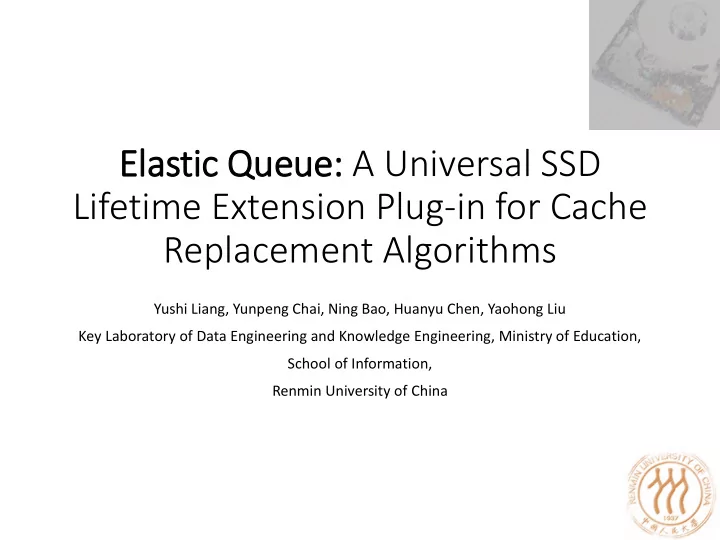

Ela lastic Queue: : A Universal SSD Lifetime Extension Plug-in for Cache Replacement Algorithms Yushi Liang, Yunpeng Chai, Ning Bao, Huanyu Chen, Yaohong Liu Key Laboratory of Data Engineering and Knowledge Engineering, Ministry of Education, School of Information, Renmin University of China
Traditional Cache Algorithm LRU LIRS • Plenty of researches − Different way of qualifying locality ARC LFU 2Q … • Adaptability to applications − Free to choose the most suitable one for certain senario
SSD-based cache • Solid State Drives - Lower price (vs. DRAM) - Higher IOPS, excellent random I/O bandwidth (vs. HDD) - Challenges - Limited times of re-writing for each unit - Unbalanced read / write performance
SSD-oriented Cache Algorithm • Friendly to SSD lifetime − LARC, L2ARC, Sievestore, WEC, ETD- Cache…. • Fixed strategy − Few choices − Diverse application feature
Our Solution • Elastic Queue − Cover the “blank zone” − Cooperate with any other cache algorithm − Provide protection to reduce SSD writes Friendly to SSD √ Elastic SSD-oriented Queue Schemes √ Adaptability to apps Traditional Schemes
Unified Priority Queue Model • Unified queue model of cache algorithms • Blocks prioritized by qualified locality • Common problem • Unstable access intervals ([Y. Chai+TOC 2015]) • Too much unnecessary traversal on the cache border • Lead to SSD worn-out rapidly Cache Border Hit Ideal Situation Cache Border Hit Practical Evict Situation
Elastic Queue Principle • Prevent hot blocks from early eviction • Pin blocks in SSD • Assigns Elastic Border (EB) • Enhance SSD endurance Cache Border Hit Ideal Situation Cache Border Hit Practical Evict Situation Elastic Border Cache Border Hit Elastic Queue Cache Size
Elastic Queue Architecture • 1 Queue + 2 Modules Provide protection SSD SSD Cache Management with El Elastic Queue Block Pinning Block UnPinning Elastic Queue Plug-in Module Module Cache Priority Queue Any cache policy
Elastic Queue Design * DTB - Distance to Border DTB 6 = 2 Full Priority Queue 1 2 3 4 5 6 7 8 9 10 10 11 11 12 12 13 13 14 15 14 15 … Cache Size Cache Border Elastic Queue 1 2 3 4 5 6 7 12 14 12 14 Cache Size Cache Border General blocks ahead of cache border • Only have metadata recorded in EQ • e.g. block 6
Elastic Queue Design Full Priority Queue 1 2 3 4 5 6 7 8 9 10 11 10 11 12 12 13 13 14 15 14 15 … Cache Size Cache Border Elastic Queue 1 2 3 4 5 6 7 12 14 12 14 Cache Size Cache Border General blocks ahead of cache border • Only have metadata recorded in EQ General blocks behind cache border • Evicted, with no metadata in EQ • e.g. block 8
Elastic Queue Design DTB 7 = 4 Elastic Border of 7 Full Priority Queue 1 2 3 4 5 6 7 8 9 10 11 10 11 12 12 13 13 14 15 14 15 … Cache Size Cache Border Elastic Queue 1 2 3 4 5 6 7 12 14 12 14 Cache Size Cache Border General blocks ahead of cache border • Only have metadata recorded in EQ General blocks behind cache border • Evicted, with no metadata in EQ Pinned blocks • Actually locate in SSD • Assigned with elastic border • e.g. border of block 7 is 4 steps further
Pinning Blocks • Purpose • Loading the most popular blocks to SSD • Timing • A free slot is available in SSD • Selection criterion EQ rity in E • Average priority • Changing tendency riori Pri • Mechanism … … #9 #5 • “Snapshot” Snapsh apshots • Short-term observation #9 #5 #1
Unpinning Blocks • Purpose • Determining where elastic borders should locate (DTB) • Evicting pinned blocks behind elastic borders • DTB determination • Classifying data with access distributions • Long-term observation Block a Block b Cache Cache Size Size Full Priority Queue Full Priority Queue
Evaluation • Evaluation criterions • Cache hit ratio • Amounts of SSD written data • Write efficiency of SSD • Traces • Coupled cache algorithms • LRU, LIRS, LARC
Overall Results * For LRU, LIRS, and LARC under all the five traces • Cache hit ratio • Higher in 66.67% of the cases • Average improvement – 17.30% • Amounts of SSD written data • Reduce 39.03 times on average • Write efficiency of SSD • 45.78 times enlarged on average
Effectiveness of EQ • Reduction of no-hit • Hotness of pinned percentage blocks
Parameter Settings • Impact of SSD Size
Parameter Settings • Impact of default distance-to-border
Summary • A universal SSD lifetime enhancement plug-in • Couple with any cache algorithm • Reduce SSD write amount • A unified priority queue model for cache algorithms • Make use of coupled cache policy • Priority Snapshot • Priority Distribution
Thank you ! Q&A
Recommend
More recommend